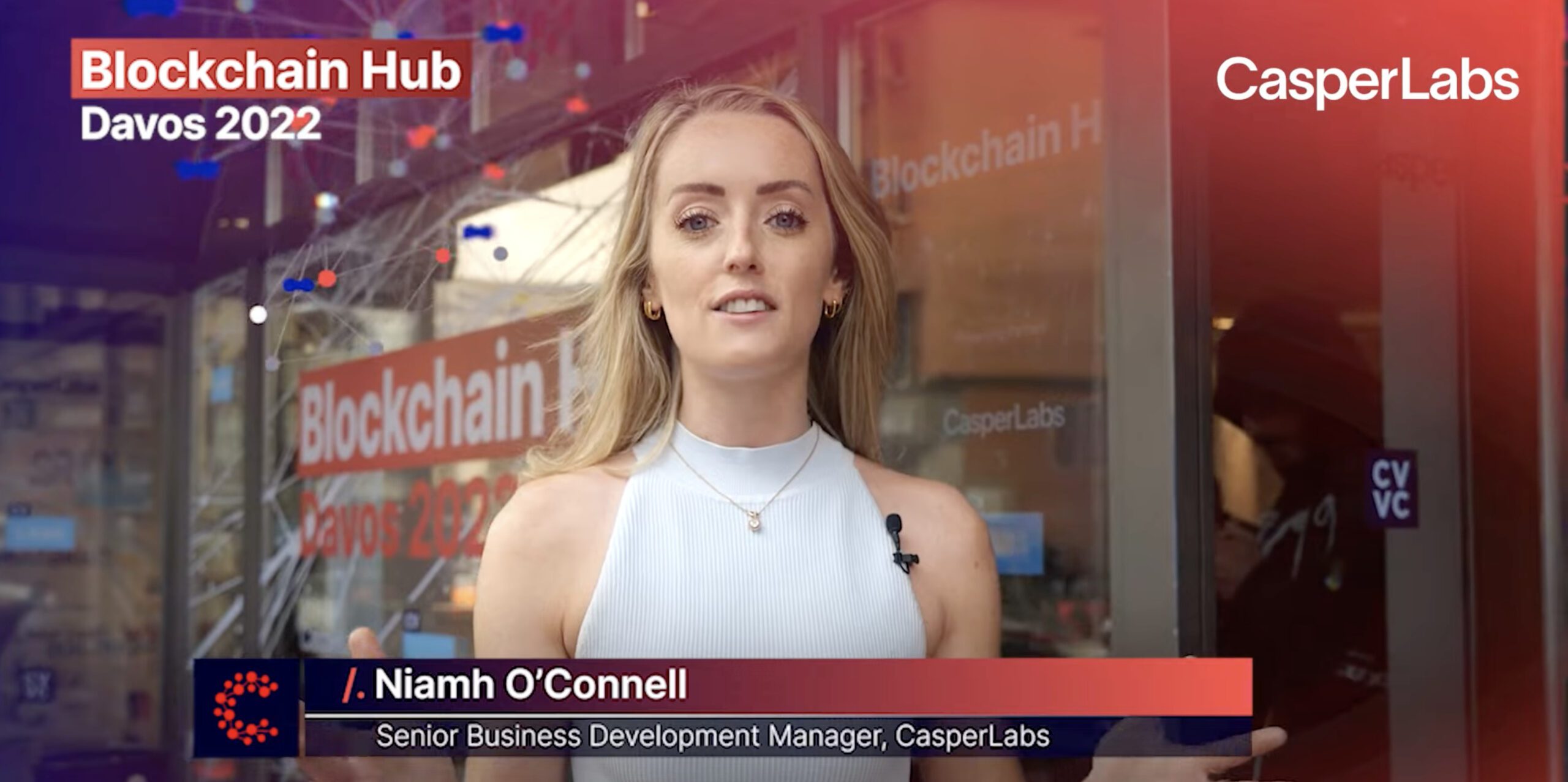In this interview with TechBullion, Niamh O’Connell, a senior business development manager at CasperLabs talks about the importance of blockchain technology as a supply chain benefit, her success stories so far in the blockchain industry, and the things that excite her the most in the current blockchain technology market.
Please tell us more about yourself?
My name is Niamh (Neeve) O’Connell and I am a senior business development manager at CasperLabs.
I’ve been working in the blockchain industry since 2016. In 2018, I was named “Blockchain Leader of the Year” at the Dublin Tech Summit and have co-authored numerous blockchain studies. I’m also the co-founder of BlockW, a female-led initiative providing a platform for communication, education, and the discussion of ideas relating to careers in blockchain.
I received my Bachelor of Business Studies from Trinity College Dublin and a Master of Science in Management Consultancy from University College Dublin.
Tell us more about your role at CasperLabs and how did you start your career?
My role at CasperLabs as senior business development manager is very exciting. I predominantly work with enterprises to help them discover how to think about and use blockchain (and NFTs) to best commercialize their business. I also spent time on go-to-market strategy efforts and support CasperLabs and our customers think about how to best bring a product to market at scale.
I really enjoy the creative/innovative aspect of my job, crafting new blockchain use cases for businesses and bringing them through a process that results in them having that “lightbulb moment” where they see “the vision” and all of a sudden get it, they’re bought into the notion. I also enjoy helping enterprises select the right Casper solution or tooling that best fits their needs to best scale and bootstrap their business in Web3.
I started my career at Deloitte and was a founding team member that set up and scaled the company’s blockchain lab for Europe, Middle East and South Africa. Before that I was with ConsenSys Ireland in 2018 and eventually joined ConsenSys U.S in 2020, working with Treum to build out their SaaS blockchain supply chain platform and co-lead the company’s customer adoption division. Additionally in 2018, I worked on the first few production-grade blockchain applications for consumer-packaged goods and in the food & agriculture industry.
What excites you the most about blockchain in 2022?
What I find most exciting is the fact that we’re seeing the industry come together and invest in cross-blockchain development, education and collaboration across the various ecosystems so developers, businesses and users can transact across different blockchains and have more choice! Interoperability of chains
is a big area of focus for all blockchain companies and foundations overseeing blockchain protocol ecosystem development as this will help drive adoption. For example, Arcadia, a blockchain software development and security consulting organization, teamed up with DotOracle Network to create the first Casper bridge with Ethereum which is live. People will soon be able to exchange virtual assets back and forth among Casper and MoonBeam Polkadot, Binance Smart Chain, Avalanche, Polygon, Fantom, and Tomochain. This will help with adoption, where a lot of these integrations are possible because of ecosystem grants.
You just returned from Davos where you led discussions on blockchain..what inspired you most about blockchain, NFTs and the future at the events?
Davos is a global showcase of the who’s who in disruptive thinking that impacts how we live and work. The fact that Eva Kaili, VP of European Parliament, and other global business leaders affirmed that blockchain is an industry at Davos is a huge win. World leaders validated that blockchain is a strategic imperative and we very much saw firsthand at our Blockchain Hub the new products, experiences and services created and presented around digital assets, enterprise & government applications, and metaverse NFTs that tackle real problems that exist today.
Could you give us an analysis of how blockchain supply chain works and the importance of blockchain as a supply chain benefit. Any use cases you would like to share with us?
To date, the majority of use cases widely adopted today have been around logistics and provenance tracking of goods, which really lays the foundation for any other use case to be built on top of this. Once you have a view into a supply chain, you can really do so many things pre- and post-sale to better engage the various stakeholders be it suppliers, OEMs, producers, or consumers. You can prove the authenticity of your product, create post-sale experiences like play-to-learn or play-to-participate and reward all the different participants along the chain!
As an international blockchain expert, could you speak to us specifically on supply chain in consumer packaged goods, food and beverage and automotive? How is blockchain benefiting these industries?
There are so many different ways to use the technology along a supply chain which could benefit these industries. Ones that come to mind which I haven’t yet touched on with you include:
- Carbon credits offsetting – rewarding suppliers (by discounts) and consumers for participating in company initiatives that help reduce emissions like recycling of goods after life or re-manufacturing of raw materials.
- Know your supplier – reputational-based marketplaces for partners, creating a discoverable and open supplier network where companies can select suppliers based on quality performance and reputation.
- Recall management – by tracking quality control checks, stakeholders could be notified of a defeat before the product goes to market, preventing the purchasing or usage of contaminated products that are harmful.
Please enlighten also on the importance of blockchain as a supply chain during tough times like pandemic and inflation and how this innovation helps businesses?
Well, let’s take the food industry. Blockchain could alleviate global food security concerns. Having a 360° view into an open supply chain, would enable the track, trace, management, and re-distribution of food.
To put this in context, about 1.3 billion tons of food is wasted each year, which is sufficient to feed 2 billion people.
It all starts with having a view into a supply chain and then building other use cases on top with an incentive scheme that rewards participation for all stakeholders involved. Today, the food, beauty, luxury, gaming, and entertainment industries are already actively providing consumers with rewards-based NFTs to enable and reward participation via an immersive and/or engaging experience.
Why are NFT’s important and what is required to make NFTs mainstream?
NFTs (non-fungible tokens) are essentially like mini computers as you can program them to send something back and forth. They can collect fees, for example. They don’t just represent ownership of an object like a one-of-a-kind artwork. They have a ton of utilities and haven’t yet been fully realized in terms of their usage and value.
As far as mainstream adoption, we’re still far away. For starters, more education, standardization across the board which will help improve UI/UX experience, usage and applications across industries. We need to get to a place where Apple products are today…where NFTs are easy to build/assemble and use, but with less packaging!
What constitutes a metaverse, why does it matter for business?
A metaverse is a digital world that’s all about one thing: immersion. In order to have such an experience, you need to be able to create a community and value for that community with non-cash incentives. Companies can create entirely new experiences, products and services and form new economies around them. I think metaverses will help open up the floodgates for unlocking NFT utility.
What are you currently working on in blockchain that excites you the most?
We, at CasperLabs, are empowering businesses to easily create and self-manage Casper NFTs on a low no-code interface that’s totally customizable. What this means is that businesses can manage their own digital NFT storefront and distribute NFTs through various mediums like social, augmented and virtual reality, GPS drops, QR codes, and email. We recently announced this with our partners at BLOCKv and SmartMedia Technologies.
I’m excited to help Brands navigate this and how to think about incentives structures that make sense for their audience and ecosystem to create value and consequently a sustainable community. Consumers need to be put back in the driver’s seat and be rewarded for the role they play in shaping products and their respective communities. After all, they are the real experts: the users of the products.
What wisdom can you provide to others wanting a career in blockchain?
 Blockchain is opening up a new frontier of career opportunities in developer and creator communities, and traditional corporate jobs. I recommend figuring out what you’re passionate about first and then see how you can apply it to the blockchain market. There’s never been such a wide range of roles available now with the rise of Web3, so this is your chance to participate. Also, join communities, events and reach out and connect with people including me https://www.linkedin.com/in/niamhoconnell1/.
Blockchain is opening up a new frontier of career opportunities in developer and creator communities, and traditional corporate jobs. I recommend figuring out what you’re passionate about first and then see how you can apply it to the blockchain market. There’s never been such a wide range of roles available now with the rise of Web3, so this is your chance to participate. Also, join communities, events and reach out and connect with people including me https://www.linkedin.com/in/niamhoconnell1/.
For women, I encourage you to join BlockW: https://www.linkedin.com/company/blockw/



































